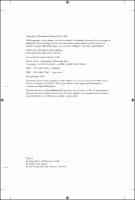Chapter 6 Prevention and stigma
the sanitary control of Muslim pilgrims from the Balkans, 1830–1914
Author(s)
Promitzer, Christian
Collection
EU collectionLanguage
EnglishAbstract
This chapter investigates the use of quarantine as an instrument of social control and as dispositive for the construction and stigmatization of the Muslim ‘other’. The study takes the under-researched case of the Hajj to Mecca from the Balkans, hence focusing on Muslims from Bulgaria and Bosnia-Herzegovina (the latter under Austrian-Hungarian rule as from 1878). Both Bosnian and Bulgarian Muslim pilgrims experienced quarantine on their return from Mecca, yet in unequal measures. Bosnian hajjis were given a more lenient quarantine than their Bulgarian co-religionists by their separate sanitary authorities – with regard to the duration of isolation and the disinfection of their bodies and personal belongings. This was due to the different political and cultural attitudes towards their Muslim minorities by these two Balkan regimes.
Keywords
bulgaria; disinfection; hajj; bosnia-herzegovina; 19th century; muslim identity; bulgaria; disinfection; hajj; bosnia-herzegovina; 19th century; muslim identity; Austria-Hungary; Balkans; Cholera; Hejaz; Mecca; QuarantineOCN
1030817175Publisher
Manchester University PressPublisher website
https://manchesteruniversitypress.co.uk/Publication date and place
2018Series
Social Histories of Medicine,Classification
European history
History and Archaeology
c 1500 onwards to present day
Social and cultural history
Society and Social Sciences
History of medicine


 Download
Download Web Shop
Web Shop